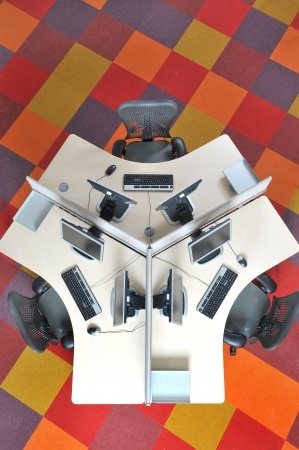Sitting Down to the Cyberspace Table
Some of the most important changes in America’s history were brought about by a group of people sitting at a table together, closed off in a private room till the wee hours of the morning. They looked into the eyes of their comrades and foes, came to well thought out compromises, shook hands and signed into effect documents like The Constitution and The Declaration of Independence. Without these sealed-with-a-handshake, societal advances, the technology that makes telecommuting possible might not even exist today.
Fortunately for the business world, it does. In the modern era, all fifty-six delegates could have passed The Declaration of Independence around through document sharing and added comments on the side as they went along. Could you imagine how John Hancock would have felt after affixing his electronic signature to this and other influential documents– fine as long as he approved it by e-mail first, of course.
Today, the idea of what that “table” consists of is changing in very drastic ways. Technology allows for the meeting room to be a video conference across continents and the wee hours of the morning to be the most convenient time of day. Coupled with smart mobile devices, file sharing and collaborative work programs, people from all corners of the world are able to work together as if they were all sitting around the same table. Telecommuting allows for many people to work from remote locations, or even better yet, their own living room.
The benefits to the worker in this situation are clear, but oftentimes the benefits to the employer are overlooked. Dimple Thakkar is Founder and CEO of Synhergy Marketing, LLC, one of the Nation’s top social media agencies, according to Mashable. Thakkar said, “Smart phones make suits, briefcases and commuting kind of pointless. When we save money and waste less time, everyone is happy. When everyone is happy, productivity, quality and engagement increases. That is why the future of office space is cyberspace.”
This new idea of the modern-day office has been a widely-debated topic for many years. More recently, many companies are beginning to recognize the advantages of telecommuting, or working from home. With benefits ranging from lower cost of overhead and government tax incentives to greater overall employee morale and productivity, many companies are implementing work-from-home programs and are already seeing the returns.
The first of many benefits of –what Generation Y is affectionately calling–‘telework’ is lowering the cost of overhead. By giving employees the option to work from home, companies across the globe are saving big bucks on workspace rent and supplies, coffee, snacks, and utility costs.
Michael Moriarty, a partner at Go Fish Digital, touched on this briefly, too, when he spoke about the way their company utilizes telework. Moriarty said, “Our digital marketing agency has office space in Tysons Corner, V.A., however we still all telecommute and only use the office space for client meetings and quarterly get-togethers.” He continued by saying that at times they rent a hotel meeting room, typically more spacious, for a more comfortable setting.
These “telecorporations” are getting more than just meetings in hotel conference rooms. The government offers incentives to business owners to encourage telecommuting. In the State of Virginia, the Telework Expenses Tax Credit rewards businesses that implement telework by offering them a tax credit of up to $1,200.00 for each employee who works from home. The State hopes to inspire more businesses to utilize telework, in an effort to decrease fuel emissions and congestion on state roads and highways.
 Federally, the Telework Enhancement Act of 2010 reiterates, “the head of each executive agency shall establish a policy under which eligible employees of the agency may be authorized to telework…” This creates incentive for companies who are both going to save money on expenses and earn credit from the government for putting telework into effect throughout their organizations. For more information about either of these acts, the links are available below for all you curious cats out there.
Federally, the Telework Enhancement Act of 2010 reiterates, “the head of each executive agency shall establish a policy under which eligible employees of the agency may be authorized to telework…” This creates incentive for companies who are both going to save money on expenses and earn credit from the government for putting telework into effect throughout their organizations. For more information about either of these acts, the links are available below for all you curious cats out there.
The majority of businesses can reduce costs of overhead and get reimbursements from the government, all because of telework. Many business owners still worry how their staff will perform without the constant presence of a big brother-like figure in their ear and looking over their shoulder (i.e. the Boss). The truth might surprise those same business owners. In the typical workplace, many employees do not feel a sense of urgency in completing their delineated tasks because the amount of time spent working is pre-established, not task specific. Imagine for a moment, if employees were told they could go home for the week once all of their tasks were completed.
Think there would be anyone in the office on Friday?
Most employees would gladly jump at the opportunity to hustle, finish their work early and enjoy that three day weekend.
Sara Sutton Fell is the founder of FlexJobs the leading site for potential employees seeking telecommuting and flexible jobs. The staff of 40 employees all work from home. Fell said “Telecommuting definitely allows for maximum productivity and creativity. Because telecommuting eliminates stress associated with traditional work – long commutes, too much time in the office, the pull between work and family obligations, etc. – it leaves a lot of space for productivity.”
Flexjobs recently published a list of the top 100 companies for remote jobs in 2014. Some of those companies include Xerox, UnitedHealth Group, American Express and Apple. For more information, follow the link to check out other corporations that have adapted quite nicely to this new ‘teleworld’.
With technology bringing the world closer together, and congestion making it harder to get from point A to point B, telecommuting seems to make all the more sense for employee and employer alike. By allowing employees to work at their own pace and in their own environment, the quality of the work product is elevated, something that should make any CEO a happy camper. Business owners can also save money and collect tax incentives for those workers who do telecommute, while simultaneously maximizing their potential.
Telework could be especially important to small business owners or people who are just starting out on their own. By drastically reducing overhead while still retaining reliable employees, who work hard and smart, you could very well propel your business to success. Whether you are part of new start-up company or a business owner who is already part of a well-established organization, SPEAK UP! Discuss telecommuting next time you’re sitting down at the table. Just by talking about how telework could help benefit your organization, new, creative ideas will start to spring forth. Then, in all possibility, you might be attending your next meeting via the couch.
16TAGS: career WiB
 Interviewer Interview Prep
Interviewer Interview Prep Impactful Mentees
Impactful Mentees Benefits of a Mentor
Benefits of a Mentor Advice for First-Time Managers
Advice for First-Time Managers Overcoming the 18-month Itch
Overcoming the 18-month Itch Dressing for Your Style
Dressing for Your Style Interview Style Tips
Interview Style Tips Women's Stocking Stuffers
Women's Stocking Stuffers Gift the Busy Traveler
Gift the Busy Traveler Father’s Day Gift Guide
Father’s Day Gift Guide Airport Layover Activities
Airport Layover Activities Traveling & Eating Healthy
Traveling & Eating Healthy Travel Like a Boss Lady
Travel Like a Boss Lady The Dual California Life
The Dual California Life Gifts for Thanksgiving
Gifts for Thanksgiving Summer Reading List
Summer Reading List Top Leisurely Reads
Top Leisurely Reads New Year, New Books
New Year, New Books Life Lessons from a Sitcom
Life Lessons from a Sitcom Oprah, Amy or Amal?
Oprah, Amy or Amal?














